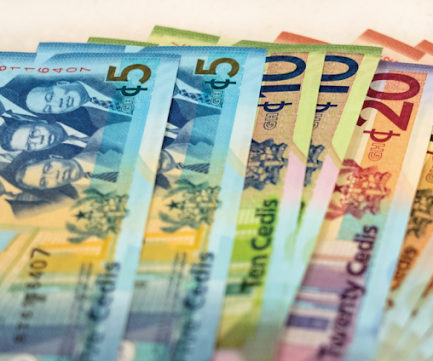 |
| The Ghana Cedi. |
The local currency has crossed the 10 cedi to 1 dollar mark on the
retail market.
GHANA News ONLINE went to
a few different banks and currency exchanges in the capital and found that the
going rate for the U.S. dollar varied from GH¢9.98 to GH¢10.10.
Some people working at currency exchange offices claim there is
a lack of dollars on the market as well.
Furthermore, they warn that things may even worsen in the
following weeks.
The Bank of Ghana reports that so far this year, the Ghana
Cedi has lost more than 25% of its value.
Ghana's inability to borrow money from the international
capital market is a major factor in the decline of the local currency in the
financial market, along with concerns over the country's unclear fiscal future
and poor investor confidence.
This occurs after the Bank of Ghana announced a 300-basis
point hike in the monetary policy rate.
According to the Central Bank, this action is part of a larger
strategy to rein in the country's spiralling inflation and rapidly falling
currency.
Reacting to this situation, Economist, Courage Boti stated
that it will take some time for the interventions to materialize.
“It is still a matter of demand and supply. For over eight to
nine weeks now, the Bank of Ghana has not done any spot market interventions.
These are also residual demands on the market that are driving the rate higher.
Until that backlog is cleared, some of these issues will linger.”
“Also, some of the interventions are yet to be implemented.
For instance, investors will be looking at our reserves that is, at 7.6
billion, and our net reserves at 3.7 billion which is short of what it was in
the past. These are the fundamentals that will continue to drive the market
until something changes. Immediately, the decision by the Central Bank to raise
the policy rate yesterday means it will take some time for liquidity to be
mopped up. This will show in the gradual upward adjustment of the interbank
interest rate. So, its effect will come over time,” he said.
Bank of Ghana took action following an emergency meeting on
August 17, 2022, by, among other things, coordinating with mining companies,
international oil companies, and their banks to buy all foreign exchange
resulting from the voluntary repatriation of export proceeds from mining and
oil and gas companies.
There is hope that this will help the cedi and the central
bank's foreign exchange auctions.
The Ghana Cedi was
recently rated by Bloomberg as the worst performing currency after the Sri-Lanka rupee.
Other interventions by the Bank of Ghana to address the situation:
- When the newly granted USD750,000,000 Afriexim loan facility is disbursed, it would strengthen the country's foreign currency position and aid in restoring trust.
- In the fourth quarter, the Cocoa Loan should be available. More foreign cash will be made available via this facility, which will assist counteract the weakening of the cedi.
- To bolster international reserves, the government has begun a Gold Purchase Program.
- In order to facilitate the import of petroleum products, the Bulk Distribution Companies (BDCs) will be holding a special Foreign Exchange Auction.
- To ensure that BOG has the chance to purchase gold when it becomes available, Bank of Ghana is entering into a collaboration arrangement with the mining firms.
- In order to assist fulfil the demand for external payments, the Bank of Ghana is providing the banking industry with liquidity in foreign currencies.
- Once the IMF programme is finalised, it will contribute
significantly to boost portfolio
flows and revive investor confidence in the economy. These actions will help
the Central Bank significantly improve its foreign currency reserve position.
Source:
ghananews.hrforum.uk




.jpeg)



0 Comments